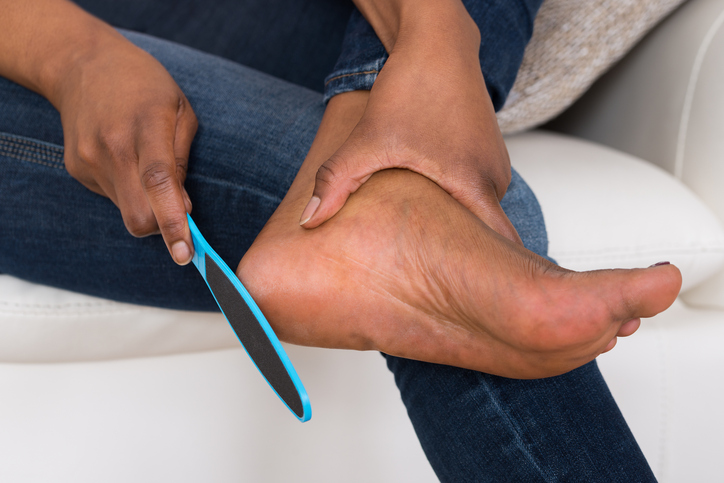Corns and calluses are the formations of thick, hard layers of skin on the feet or toes that may appear as rough, dry patches or as sharp and raised bumps. They develop to protect your feet from the pressure and friction that it has to endure. Usually, corns and calluses just cause pain. However, if you have diabetes, corns and calluses could pose more serious issues as you may suffer from diabetic neuropathy which is a nerve disorder.
Diabetes causes poor blood flow and reduced sensation due to nerve damage and hence, many diabetic patients suffer from foot problems. If foot issues are left untreated, a diabetic patient may need extensive surgery or perhaps even limb amputation. Therefore, you must regularly monitor your blood sugar levels and keep checking your feet for corns and calluses.
Difference between calluses and corn
Calluses are not painful. They are larger and can develop on the soles and balls of the foot, which are under pressure due to weight. Corns are smaller with a hard center and develop on the sides and the toes of the foot which do not bear weight. The area around the corn may become inflamed and can be painful.
Visiting a good podiatrist is the best option when you notice corns and calluses in your feet. It becomes more essential to get it removed if you are a diabetic to avoid further complications.
The best podiatry clinic in Irvine
Visit Dr. Seema Soltani for corn removal Orange County as she is the best podiatrist with 20+ years of experience and is dedicated to improving health through preventive measures and recommended treatments for any kind of foot trauma. This podiatric clinic in Irvine specializes in non-surgical treatments. They offer treatment for various podiatric conditions like bunions, hammertoes, plantar warts, joints, ankle sprains, wound care, diabetic foot care, neuromas, custom diabetic and orthotics shoes, laser fungal nails, and sports injuries. Make an appointment with their podiatrist for treating any kind of foot trauma conditions.
Why is it important for diabetics to treat corns and calluses?
Untreated corns and calluses can cause irritation and can ulcerate and get infected. These infected sores may not heal correctly because diabetes results in a reduced flow of oxygen to the lower legs and feet. Extremely infected corn can result in gangrene, or tissue death due to lack of blood flow. The bacterial infection might also need an amputation. Laser callus removal Orange County ensures your callus is removed without any surgical procedure.
While corns typically produce considerable discomfort, some patients may not be aware of them due to peripheral neuropathy. Hence, it is important to keep checking your feet for corn. Peripheral neuropathy damages peripheral nerves, which means that even if your feet hurt, you might not feel anything there. You could get skin infection without realizing it if you can’t feel corn in between your toes or on the bottom of your feet.
Treating corns and calluses
It is important to meet a podiatrist for corn and callus removal Irvine as soon as they appear. Using over-the-counter products at home to remove corns and calluses at times, does not prove effective.
Medicated acids in the liquids and pads dissolve the foot corns and calluses but they are not that effective. It is also not a good idea to use pumice stones or other non-medication foot treatments. These aren’t sterile, and because they can abrade or split the skin, they may serve as a point of entry for an infection that your foot isn’t equipped to handle.
How is foot corn removal done by a podiatrist?
Corn removal surgery is a quick and short procedure of approximately 30 minutes that is done by a podiatrist in the clinic. After giving local anesthesia in the affected area, your podiatrist carefully removes the layers of dead skin with a sterilized scalpel and reaches the root of the corn. A few sutures may be required to close the surgical region, and some bleeding is expected during the procedure. Your podiatrist will put a bandage on the area after the corn has been removed to keep it clean and stop bleeding.
It is advised not to ignore corns and calluses and visit an experienced podiatrist if you have diabetic neuropathy so that your feet can be examined and relevant treatment can be provided.

